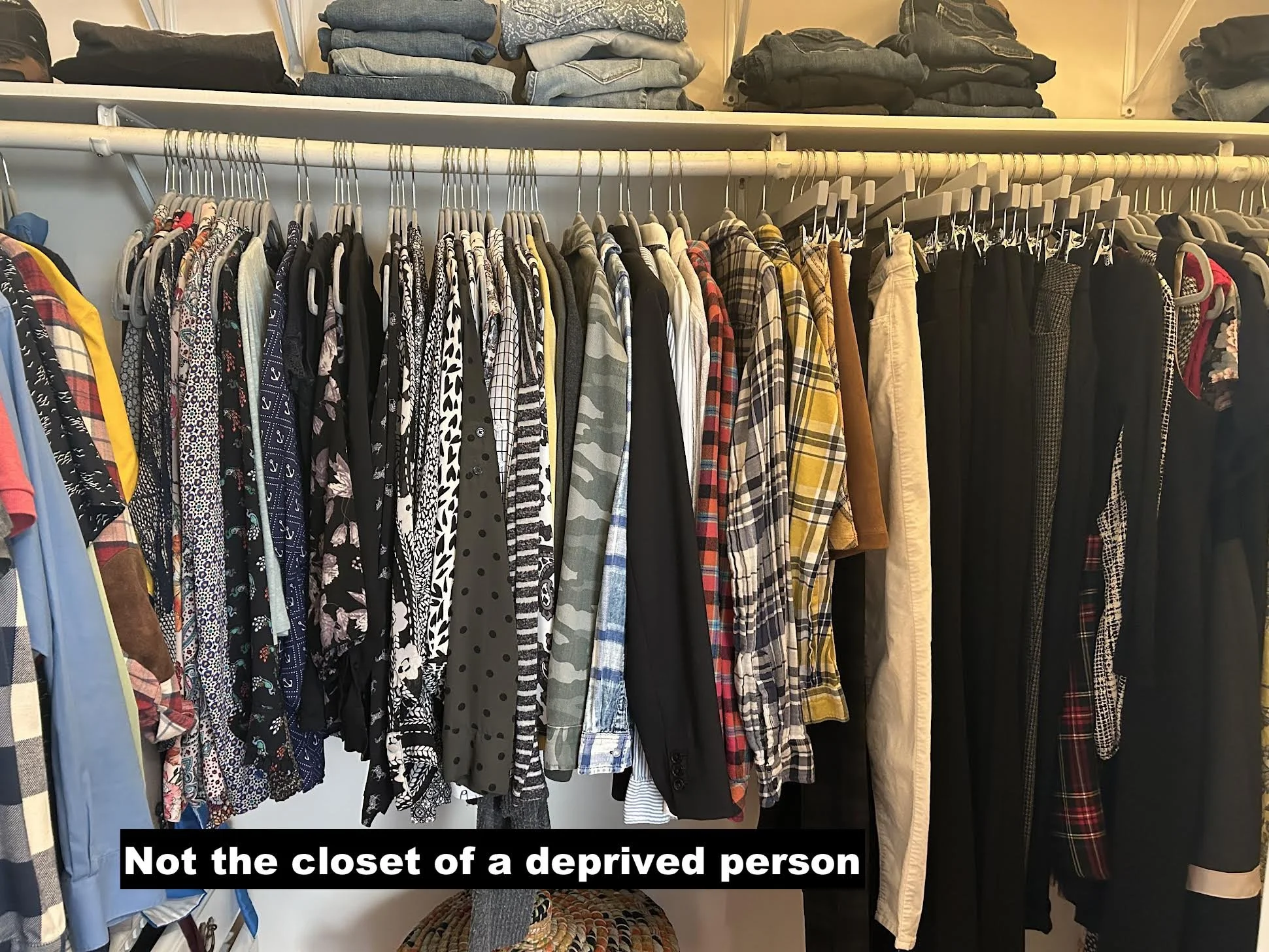Can I Go A Whole Year Without Buying Clothes?
When Mr. Sense and I drew up our financial plan for 2024, we were focused on outdoing our past selves in the giving and saving categories, which entailed finding some additional spending cuts. We did some soul searching about the spending that really matters (experiences and education for the kids) and estimated the likelihood and magnitude of surprise expenses (our home was built in 1870, so things…come up). After figuring out how much we wanted to cut to hit our goals, we zeroed in on where we could find those savings.
We’ve been living more frugally for a while now, so there weren’t any glaring black holes in our prior year’s spreadsheet. But we noticed recurring charges for clothing. Not just for the kids– that’s to be expected, especially for our son, who might be taller again by the time he gets home from school tomorrow. Somehow, I accumulated several more articles of clothing for myself, even though I was already in possession of a very full closet.
This was an easy target for cutting back, since I certainly don’t need any more clothes at this point. I committed to buying no clothing for myself in 2024. More than a quarter of the way through, this has been a piece of cake.
So far, I haven’t even been tempted to buy more clothes, and this is a direct result of my choice to avoid even looking. I’m certainly not going to sign up for emails from retailers trying to convince me to break my goals! I haven’t browsed TJ Maxx or Target, and when I was at Goodwill recently, I didn’t even walk through the women’s clothing areas.
Even without buying clothes for myself, my collection has still managed to grow. A neighbor generously gave Kid Sense a whole bunch of her grown up daughter’s old clothes, and after Kid took what she wanted, there was plenty left. I took some, my mom grabbed a few pieces, and even my grandmother snagged a nice sweater!
I haven’t made any exceptions on the no-buy year yet, though I’m staying open to a couple narrow possibilities. I may have to buy some more socks, because Mr. Sense and I share the same collection of socks and I gather he must put them on as if he’s wrestling a bear– toe and heel holes seem to appear in the ones he wears pretty quickly. Now that Mr. Sense has started working out more, the two of us go through four or five pairs of socks a day, causing a ridiculous amount of laundry. The only other exception I’m considering is for running shoes, because I’ve increased my weekly mileage enough that I’m likely to need them well before the end of the year (despite having a fresh pair I received for Christmas still stashed in my closet). I’m not worried about stylishness, but I find squished down soles give me painful shin splints. Most estimates I’ve found online say the Brooks Glycerin 20s I wear should last 450 miles, which is about four months for me.They’ve been deeply discounted since a new model was released, so I may pick up a pair or two of the old version. I barely count this as “clothing” though– more like a specialized tool for a specific purpose. Readers: feel free to comment if I’m fooling myself here!
I expect this moratorium on clothes shopping will save me $300-$600 this year, but it could save a bigger shopper a whole lot more– I spent a LOT more than this on clothes before starting down the FIRE path. According to a 2023 study from the U.S. Bureau of Labor Statistics, the average American household spent $1945 annually on “apparel and services” in 2022, the most recent year in the study.
The benefits of a no-buy year go beyond your wallet. Virtually everyone has heard about the environmental costs of cheaply made clothing. We should be conscious of the other effects of the fast fashion industry, most notably dangerous working conditions for our fellow humans in other corners of the globe. Not buying stuff we don’t need has an impact beyond our own households, and while I’m far from well educated about all the externalities of clothing production, I’m aware enough that I see value beyond saving money to avoiding excess consumption and buying used items from thrift stores when possible.
Opting out of unnecessary clothing purchases for a relatively short period of time won’t have any negative impact on my quality of life. Besides helping me get closer to my financial goals, I believe this will help me remember how ridiculously blessed I am with the closet I have. Over and over again, my FIRE journey presents reminders of the incredible bounty God has provided my family, which helps me practice gratitude whenever I start getting side tracked by an advertisement for another material thing that won’t get me one step closer to my goals.

